b. January 19th, 1925 in Kenner (Louisiana)
d. February 17th, 2020 in Baton Rouge (Louisiana)
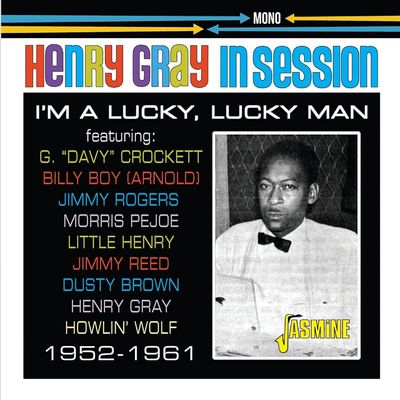
HENRY GRAY IN SESSION : I'M A LUCKY LUCKY MAN
Jasmine
May 1953 / December 1955
Pianiste important du Chicago Blues mais aussi du Swamp Blues, Henry Gray passe son enfance à Alsen, une petite bourgade proche de Baton Rouge. Il apprend le piano dès ses huit ans grâce à une voisine. En 1943, il prend part à la seconde guerre mondiale, participant notamment à la guerre du Pacifique. Revenu aux Etats-Unis en 1946, Henry retourne vivre à Alsen quelques temps avant de déménager à Chicago. Au début des années 50, il forme avec son ami le guitariste Morris Pejoe - originaire de Louisiane comme lui - un duo qui sera l'attraction principale du Upstairs Lounge pendant deux ans. Remarqué par Big Maceo, il subit aussi l'influence de ce grand pianiste. Progressant rapidement, il devient un sideman renommé jouant derrière Jimmy Reed, Bo Diddley, Billy Boy Arnold, Jimmy Rogers, Homesick James, Little Walter, Dusty Brown pour la plupart des labels de la ville (Chess, Vee-Jay, Parrot, States). Dans le même temps, il grave ses premiers morceaux pour Chess sous le nom de Little Henry : "I declare that ain't right", "Matchbox blues". Henry est accompagné par Henry Strong (un superbe harmoniciste décédé prématurément en 1954 à 25 ans), son ami Morris Pejoe (guitare) et Earl "Stovepipe" Phillips (batterie). En 1955, il rejoint le groupe d'Howlin' Wolf dont il devient le pianiste attitré pendant une douzaine d'années participant à de nombreuses séances et plusieurs tournées. Il aurait, d'ailleurs, du participer à la tournée de l'American Folk Blues Festival de 1964 derrière Howlin' Wolf mais son père tomba malade et Henry déclina l'invitation. Malgré qu'il ait rejoint le groupe du Wolf en 1955, il continue néanmoins à enregistrer en leader quand l'occasion se présente. Ainsi, il grave quatre excellentes faces pour Parrot (le label d'Al Benson) : "Watch yourself" et surtout "Goodbye baby" et "You messed up". Sur ce CD édité par Jasmine en 2023 sont compilés les premiers simples d'Henry Gray mais aussi ses faces en tant que sideman.
Important Chicago Blues but also Swamp Blues pianist, Henry Gray grew up in Alsen, a small town near Baton Rouge. He learned the piano from his eight years with a neighbor. In 1943, he took part in the second world war, including participating in the Pacific War. Came back in the United States in 1946, Henry went back to live in Alsen for some time before moving to Chicago. In the early 50's, he formed with his friend guitarist Morris Pejoe - a Louisiana native like him - a duo that will be the main attraction of Upstairs Lounge for two years. Spotted by Big Maceo, he was also influenced by this great pianist. Improving quickly, he became a renowned sideman playing behind Jimmy Reed, Bo Diddley, Billy Boy Arnold, Jimmy Rogers, Homesick James, Little Walter, Dusty Brown for most of the city labels (Chess, Vee-Jay, Parrot, States). At the same time, he cut his first tracks for Chess as Little Henry : "I declare that ain't right", "Matchbox blues". Henry is accompanied by Henry Strong (a superb harpist died prematurely in 1954 at 25), his friend Morris Pejoe (guitar) and Earl "Stovepipe" Phillips (drums). In 1955, he joined the Howlin' Wolf band and became his regular pianist for a dozen years participating in numerous sessions and several tours. He would, indeed, participate in the American Folk Blues Festival 1964 tour behind Howlin' Wolf, but his father fell ill and Henry declined the invitation. Despite that he has joined the Howlin' Wolf group in 1955, he continues recording as a leader when the opportunity arises. So, he records four excellent sides for Parrot (the Al Benson label) : "Watch yourself" and especially "Goodbye baby" and "You messed up". On this CD issued by Jasmine in 2023, Henry Gray's first singles are compiled but also his sides as a sideman.
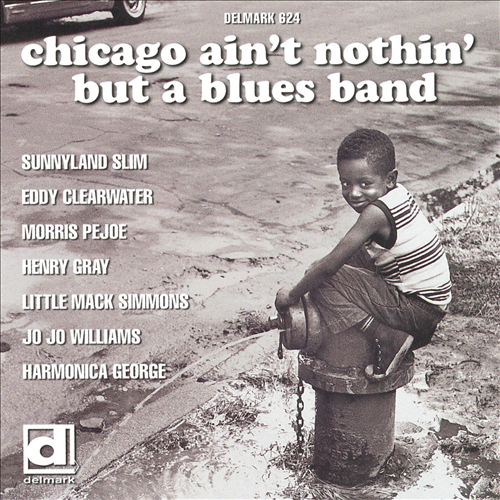
CHICAGO AIN'T NOTHIN' BUT A BLUES BAND
Delmark
March 1958
On peut retrouver "How can you do it" - morceau gravé pour le label Atomic H avec Morris Pejoe - dans la version CD de cette belle anthologie (attention, ce morceau ne figure pas dans la version LP).
We can find "How can you do it" - track cut for Atomic H label with Morris Pejoe - in the CD version of this beautiful anthology (be careful, this track does not appear in the LP release).
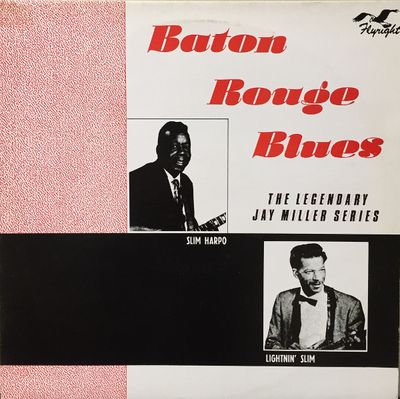
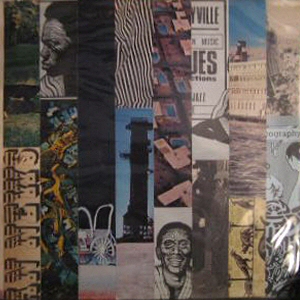
BATON ROUGE BLUES
Flyright
BLUES OBSCURITIES vol.9 : NATURAL BORN MAN
Blues Obscurities
March 1970
Henry Gray quitte le groupe d'Howlin' Wolf en 1968 et retourne vivre à Alsen pour aider sa mère (son père vient de mourir) et travailler au commerce familial. Il exercera également le métier de couvreur pendant plusieurs années sans jamais abandonner la musique. Il enregistre, d'ailleurs, le superbe "Cold chills" à Crowley pour le producteur Jay Miller avec "Lazy" Lester à l'harmonica. Pour Miller, il a aussi gravé un simple sorti sur Blues Unlimited et réédité sur "Blues obscurities vol.9" ("You're my midnight dream" et le remarquable "I'm a lucky lucky man").
Henry Gray left the Howlin' Wolf band in 1968 and returned to live in Alsen to help his mother (his father has just died) and work in the family store. He works also as a roofer for many years without ever give up music. He records, indeed, the superb "Cold chills" in Crowley for the producer Jay Miller with "Lazy" Lester on harmonica. For Miller, he also burned a single released on Blues Unlimited and reissued on "Blues obscurities vol.9" ("You're my midnight dream" and the remarkable "I'm a lucky lucky man").
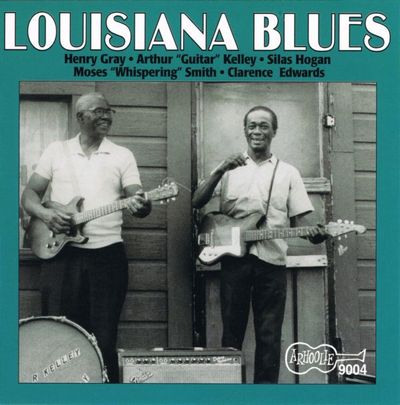
LOUISIANA BLUES
Arhoolie
April 1970
Dans cette anthologie assemblée par Chris Strachwitz et Terry Pattison, Henry Gray est accompagné de "Whispering" Smith (harmonica), le guitariste Clarence Edwards qui vit à Alsen comme lui et Samuel Hogan (le fils de Silas Hogan) à la batterie. Il interprète "The blues won't let me take my rest" ainsi que de nouvelles versions de "Lucky lucky man" et "Cold chills".
In this anthology assembled by Chris Strachwitz and Terry Pattison, Henry Gray is accompanied by "Whispering" Smith (harmonica), guitarist Clarence Edwards who lives in Alsen like him and Samuel Hogan (son of Silas Hogan) on drums. He interprets "The blues won't let me take my rest" as well as new versions of "Lucky lucky man" and "Cold chills".
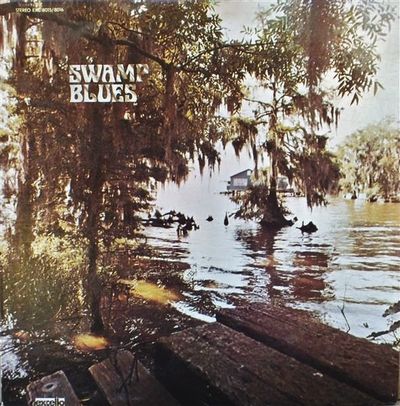
SWAMP BLUES
Excello
Blue Horizon
Ace
August 1970
On peut entendre ici Henry Gray seul au piano sur trois titres magnifiques : "Gray's bounce", "Showers of rain" et une reprise du "Worried life blues" de Big Maceo. Ces séances furent produites par Mike Vernon et Terry Pattison.
Here you can hear Henry Gray alone on piano on three beautiful songs : "Gray's bounce", "Showers of rain" and a cover of Big Maceo's "Worried life blues". These sessions were produced by Mike Vernon and Terry Pattison.
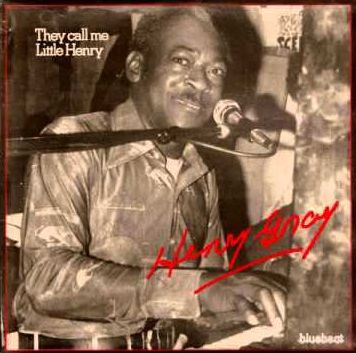
THEY CALL ME LITTLE HENRY
Bluebeat
March 1977
Dès 1976, il figure fréquemment à l'affiche du New Orleans Jazz & Heritage Festival. Lors d'une de ses prestations, il est remarqué par le pianiste allemand Christian Rannenberg qui le recommande au promoteur Rolf Schubert. Grâce à ce dernier, Henry trouve l'opportunité de tourner en Europe et d'enregistrer son premier disque. Gravé à Cologne (Allemagne), produit par Hans Ewert, cette première publication présente Henry seul au piano. La première face est consacrée à des reprises, la seconde à ses compositions personnelles. Un disque plutôt plaisant et intéressant.
Since 1976, he frequently appears at the New Orleans Jazz & Heritage Festival. During one of his performances, he was noticed by german pianist Christian Rannenberg who recommends him to promoter Rolf Schubert. With the latter, Henry found the opportunity to tour Europe and record his first album. Recorded in Cologne (Germany), produced by Hans Ewert, this first publication presents Henry alone on piano. The first side is devoted to covers, the second to his own compositions. A rather pleasant and interesting record.
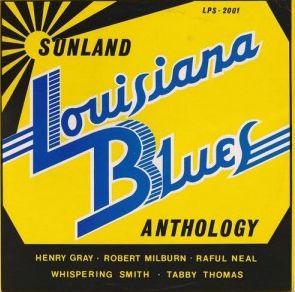
LOUISIANA BLUES
Sunland
November 1982
Malgré un album européen en 1977, Henry Gray reste désespérément ignoré dans son propre pays. Grâce à Robert Scheir et William Dudley, il grave deux titres dans cette anthologie en leader d'un groupe local (avec "Whispering" Smith à l'harmonica) : "Don't start that stuff", "Talkin' about you". A la fin de l'album, Henry Gray, "Whispering" Smith et "Tabby" Thomas sont rassemblés sous le nom de Mighty House Rockers pour le morceau "House rocker jump".
Despite a european album in 1977, Henry Gray remains desperately ignored in his own country. Thanks to Robert Scheir and William Dudley, he cut two titles in this anthology as a leader of a local group (with "Whispering" Smith on harmonica) : "Don't start that stuff", "Talkin' about you". At the end of the album, Henry Gray, "Whispering" Smith and "Tabby" Thomas are gathered together under the name of Mighty House Rockers for the song "House rocker jump".
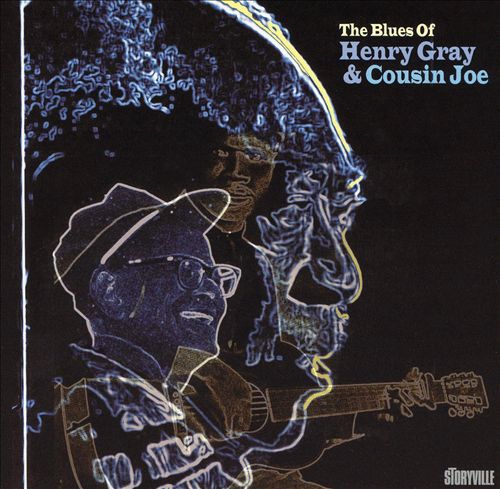
THE BLUES OF HENRY GRAY AND COUSIN JOE
Storyville
August 1984
Album partagé entre deux pianistes louisianais - Henry Gray et Cousin Joe - sur une scène de La Nouvelle Orléans. Une performance sans grande surprise mais sympathique.
Album shared between two Louisiana pianists - Henry Gray and Cousin Joe - on a New Orleans stage. A nice performance but without great surprise.
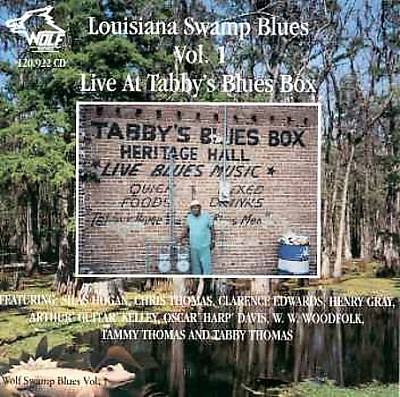
LOUISIANA SWAMP BLUES vol.1 : LIVE AT TABBY'S BLUES BOX
Wolf
May 1987
Un morceau d'Henry Gray ("It hurts me too") capté au club de "Tabby" Thomas (le Tabby's Blues Box).
A track of Henry Gray ("It hurts me too") captured at "Tabby" Thomas' club (Tabby's Blues Box).
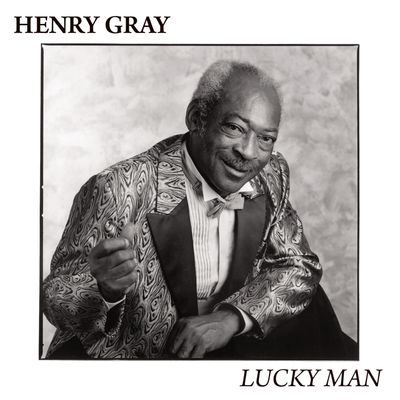
LUCKY MAN
Blind Pig
1988
Après une performance remarquée au Chicago Blues Festival en 1987, il peut enregistrer, l'année suivante, son premier disque américain (il a déjà 63 ans) grâce au label Blind Pig. Gravé à Chicago avec Steve Freund (guitare et production), Bob Stroger (basse) et Willie Smith (batterie), il s'agit d'un album consistant et varié qui vaut l'écoute. Celui-ci obtint un bon succès et attira l'attention sur lui. Henry Gray apparait alors un peu partout dans de nombreux festivals et retourne sur le sol européen. Malheureusement, malgré le titre de ce bon album, sa maison de Baton Rouge est détruite par une tornade en 1989.
After a remarkable performance at the Chicago Blues Festival in 1987, he can record, the following year, his first american record (he was already 63 years old) with the Blind Pig label. Recorded in Chicago with Steve Freund (guitar, production), Bob Stroger (bass) and Willie Smith (drums), this is a consistent and varied album that is worth listening. It obtains a good success and attracted attention to him. Henry Gray then appears everywhere in numerous festivals and returns on European ground. Sadly, despite the title of this good album, his home in Baton Rouge is destroyed by a tornado in 1989.
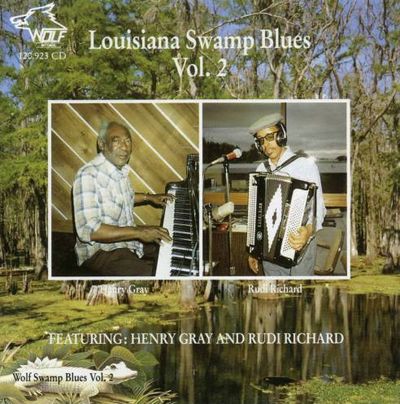
LOUISIANA SWAMP BLUES vol.2
Wolf
April 1990
Henry Gray partage ce disque de bonne facture avec Rudi Richard. Accompagné simplement de David Hill (basse) et Jess Kenchin (batterie), il délivre quelques morceaux assez convaincants comme "Cold chills" et "Talkin' about you".
Henry Gray sharing this good album with Rudi Richard. Supported by David Hill (bass) and Jess Kenchin (drums), he delivers a few tracks quite convincing as "Cold chills" and "Talkin' about you".
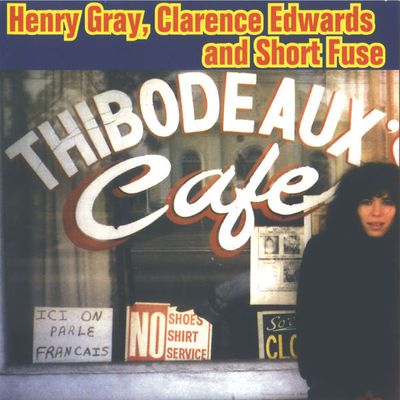
THIBODEAUX'S CAFE
Sidetrack
1992
Sur cet album relatant une performance en public en Angleterre, Henry interprète sept morceaux en leader. Une prestation intéressante mais mineure.
On this album relating a public performance in England, Henry performs seven songs as a leader. An interesting but minor performance.
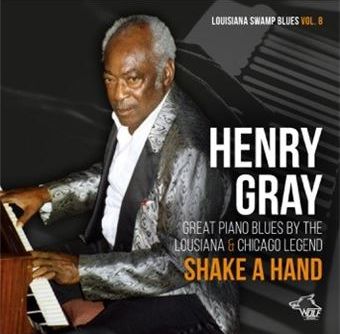
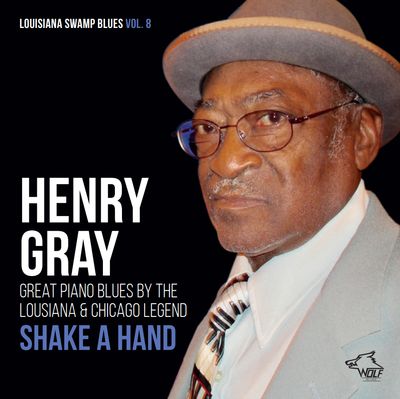
SHAKE A HAND
Wolf
April 1995 / March - April 1996
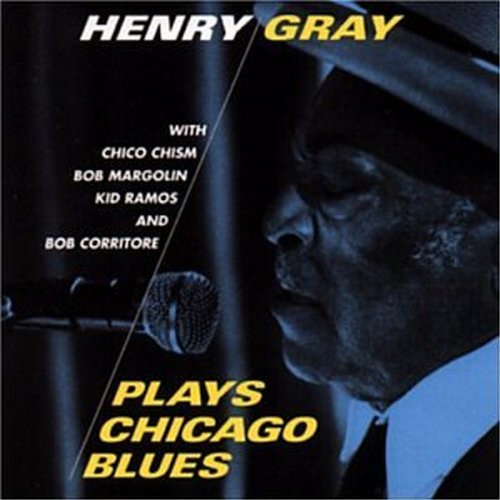
HENRY GRAY PLAYS CHICAGO BLUES
Hightone
HMG
January - September 1996 / October 1997
Entouré d'un groupe compétent (Bob Corritore, Bob Margolin, Kid Ramos, Chico Chism), Henry propose un cocktail de standards du blues et de compositions personnelles bien réalisés malgré une voix un peu limitée par moments. Un album plaisant produit par Bob Corritore.
Surrounded by a competent group (Bob Corritore, Bob Margolin, Kid Ramos, Chico Chism), Henry offers a well done cocktail of blues standards and original compositions despite a somewhat limited voice sometimes. A pleasant album produced by Bob Corritore.
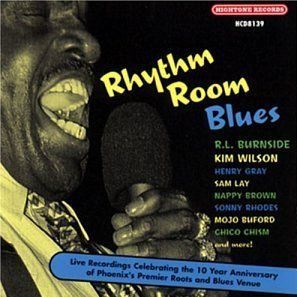
RHYTHM ROOM BLUES
Hightone
September 1996
Pour les 10 ans du club de Bob Corritore (le Rhythm Room à Phoenix), cette anthologie recueille quelques performances sur cette scène de divers bluesmen. Parmi ceux-ci, on entend Henry Gray sur "Sinner's prayer" et "Henry's houserocker" (une très belle version uniquement accompagné de la batterie de Chico Chism).
For the 10 years anniversary of Bob Corritore's club (The Rhythm Room in Phoenix), this anthology gathers some performances on this stage by various bluesmen. Among these, Henry Gray can be heard on "Sinner's prayer" and "Henry's houserocker" (a beautiful version accompanied only by Chico Chism on drums).
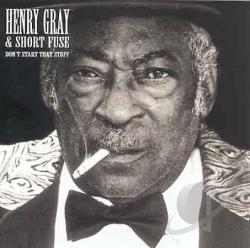
DON'T START THAT STUFF
Sidetrack
Last Call
1996
Produit par Steve Coleridge (qui tient aussi la basse), gravé en Angleterre, ce disque possède un son plus percutant que d'habitude. Plusieurs morceaux sortent du lot comme "They raided the joint", "The night time", "Got my mojo working", "Don't start that stuff" et une reprise inattendue du "Tutti frutti" de Little Richard.
Produced by Steve Coleridge (who also play bass), cut in England, this record has a more percussive sound than usual. Several pieces stand out like "They raided the joint", "The night time", "Got my mojo working", "Don't start that stuff" and an unexpected cover of "Tutti frutti" by Little Richard.
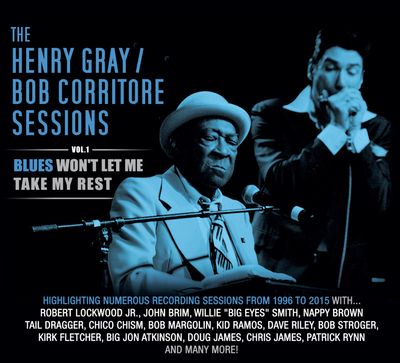
THE HENRY GRAY & BOB CORRITORE SESSIONS vol.1 : BLUES WON'T LET ME TAKE MY REST
Delta Groove
1996 - 2015
Bob Corritore a rassemblé ici des morceaux provenant de différentes séances - entre 1996 et 2015 - avec une pléiade de musiciens invités (Robert Lockwood Jr, John Brim, Nappy Brown, Dave Riley, Bob Margolin, Chris James, Kid Ramos, Chico Chism et bien d'autres). La plupart des faces présentées sont inédites. On apprécie une superbe version de "Blues won't let me take my rest" mais aussi "Trouble blues", "That ain't right", "Boogie woogie ball". Il y a quelques morceaux où Henry Gray n'est pas le leader (comme sur "Ride with your daddy tonight" chanté par Dave Riley).
Bob Corritore gathered here tracks from different sessions - between 1996 and 2015 - with a host of guest musicians (Robert Lockwood Jr, John Brim, Nappy Brown, Dave Riley, Bob Margolin, Chris James, Kid Ramos, Chico Chism and many others). Most of the sides compiled are unissued. We appreciate a great version of "Blues won't let me take my rest" but also "Trouble blues", "That ain't right", "Boogie woogie ball". There are some songs where Henry Gray was not the leader (like "Ride with your daddy tonight" sung by Dave Riley).
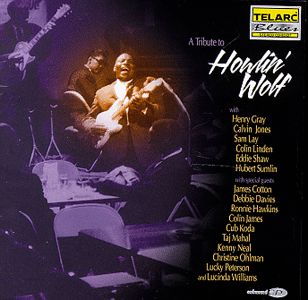
A TRIBUTE TO HOWLIN' WOLF
Telarc
July 1997
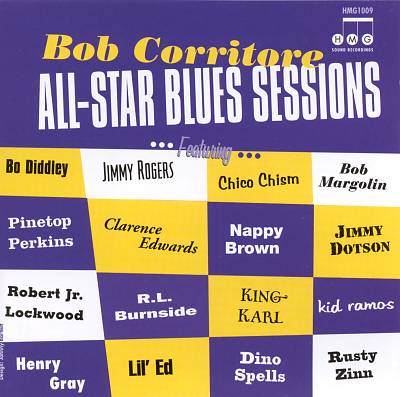
ALL-STAR BLUES SESSIONS
HMG
October 1997
Gray propose une reprise du "How many more years" (composé par son ancien leader Howlin' Wolf).
Gray delivers a cover of "How many more years" (composed by his former leader Howlin' Wolf).
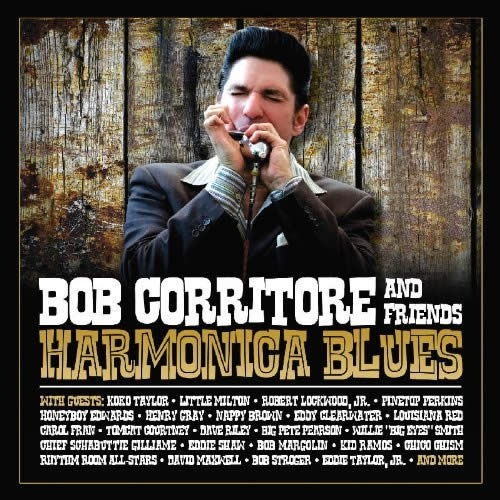
HARMONICA BLUES
Delta Groove
October 1997
Une belle interprétation de "Things have changed" avec l'harmonica de Bob Corritore.
A beautiful rendition of "Things have changed" with the harmonica of Bob Corritore.
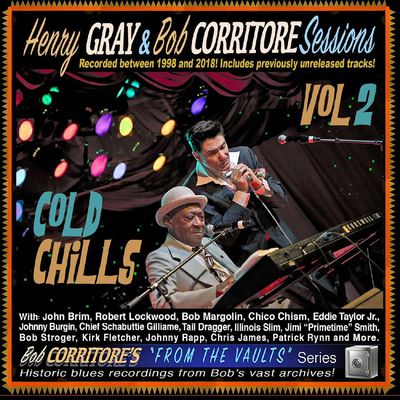
THE HENRY GRAY & BOB CORRITORE SESSIONS vol.2 : COLD CHILLS
South West Musical Arts Foundation - Vizztone
1998 - 2018
Pour la seconde fois, l'harmoniciste et producteur Bob Corritore a rassemblé de nombreux titres provenant de différences séances capturées sur une dizaine d'années. Autour d'Henry Gray - en forme au chant et au piano - et de Corritore, on retrouve une impressionnante liste d'invités donnant leur meilleur. Henry joue sur tous les morceaux et chante sur la moitié d'entre eux. On l'entend sur "Cold chills", "Look out Mabel", "Mother in law blues" ou "Ain't no use". On peut retenir aussi les excellents "Moonlight blues" (chanté par John Brim), "Going away blues" (chanté par Eddie Taylor Jr) et "Javelina jamboree" (chanté par Chief Schabuttie Gilliame).
For the second time, harmonica player and producer Bob Corritore has brought together many tracks from different sessions captured over ten years. Around Henry Gray - in good shape on vocals and piano - and Corritore, there is an impressive list of guests giving their best. Henry plays on all the songs and sings on half of them. We hear him on "Cold chills", "Look out Mabel", "Mother in law blues" or "Ain't no use". We can also point out the excellent "Moonlight blues" (sung by John Brim), "Going away blues" (sung by Eddie Taylor Jr) and "Javelina jamboree" (sung by Chief Schabuttie Gilliame).
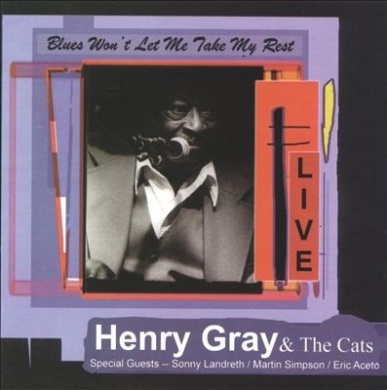
BLUES WON'T LET ME TAKE MY REST
Lucky Cat
March 1999
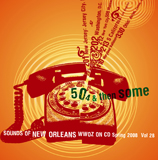
WWOZ ON CD : 504 AND THEN SOME
Friends of WWOZ
May 2000 or 2001
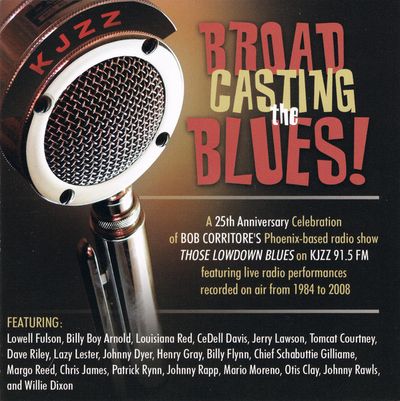
BROADCASTING THE BLUES
South West Musical Arts Foundation
?
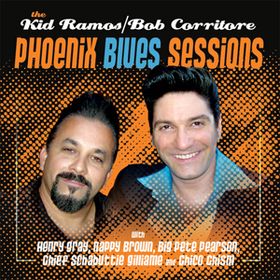
PHOENIX BLUES SESSIONS
South West Musical Arts Foundation
?
Henry Gray prend ici deux morceaux en leader : "I held my baby last night" et "Talkin' about you".
Henry Gray takes here two tracks as a leader : "I held my baby last night" and "Talkin' about you".
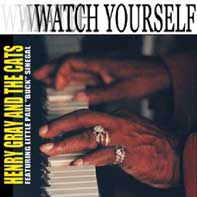
WATCH YOURSELF
Lucky Cat
August - November 2000
Gravé avec son groupe régulier The Cats (avec notamment Paul "Lil' Buck" Sinegal), cet album est tout à fait consistant, contenant quelques belles réussites comme "Watch yourself", "Cold chills", "Scratch the cat", une puissante lecture de "Dust my broom" et une reprise du "Hurt my feelin's" composé par son ami Morris Pejoe.
Recorded with his regular band The Cats (including Paul "Lil' Buck" Sinegal), this album is quite consistent, containing several nice titles like "Watch yourself", "Cold chills", "Scratch the cat", a powerful reading of "Dust my broom" and a cover of "Hurt my feelin's" composed by his friend Morris Pejoe.
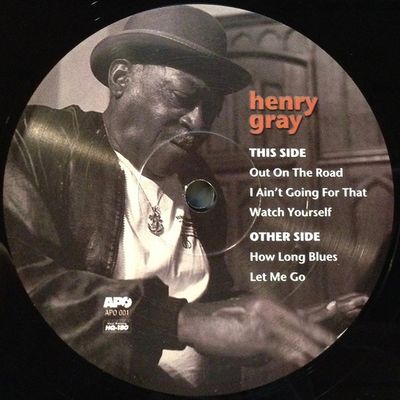
HENRY GRAY (EP)
APO
October 2000
Ce disque rencontra d'importants problèmes de production et ne fut finalement édité que tardivement. Dans cette courte séance, Henry Gray joue seul au piano sur 5 bons morceaux. Il s'agit donc beaucoup plus d'un EP que d'un album complet.
This disc encountered major production problems and was finally released only late. In this short session, Henry Gray plays alone on piano on 5 good tracks. It is therefore much more of an EP than a full album.
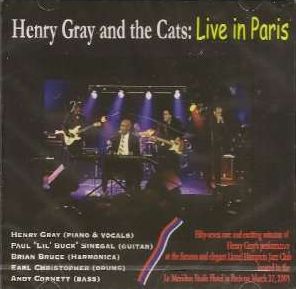
LIVE IN PARIS
Lucky Cat
March 2003
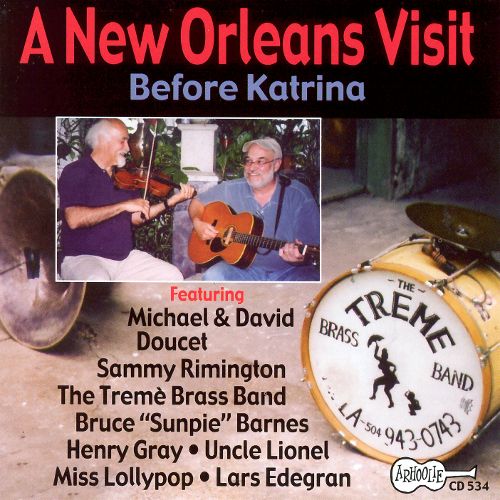
A NEW ORLEANS VISIT BEFORE KATRINA
Arhoolie
April 2005
Cette séance fut enregistrée peu avant l'ouragan Katrina par Chris Strachwitz à l'occasion du tournage d'un documentaire de Maureen Gosling et Chris Simon. Figure de la Nouvelle Orléans, Henry Gray joue ici quatre morceaux de bonne facture seul au piano.
This session was recorded shortly before hurricane Katrina by Chris Strachwitz during the filming of a documentary by Maureen Gosling and Chris Simon. Figure of New Orleans, Henry Gray plays here four good tracks alone on piano.
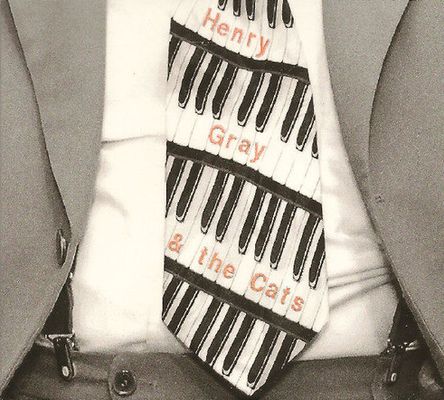
TIMES ARE GETTIN' HARD
Lucky Cat
2009
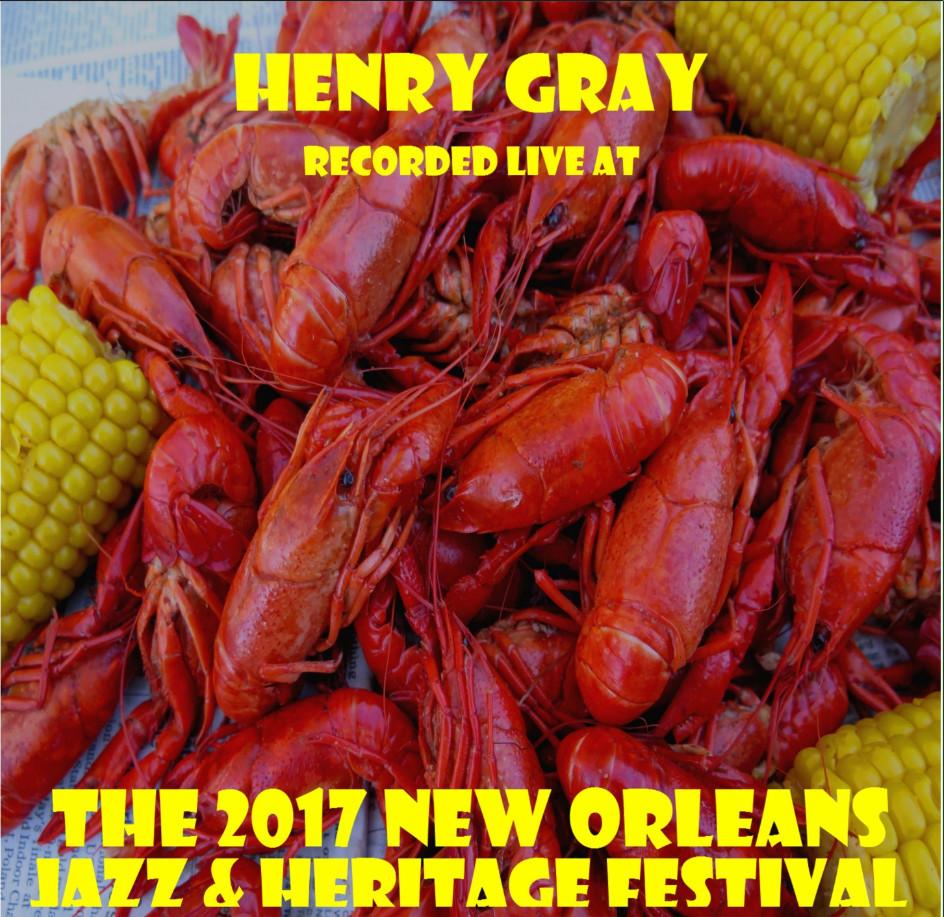
LIVE AT 2017 NEW ORLEANS JAZZ & HERITAGE FESTIVAL
Munck Music
2017
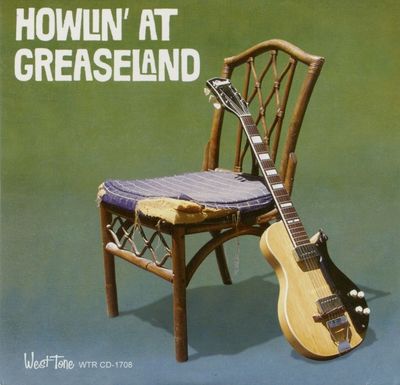
HOWLIN' AT GREASELAND
West Tone
2017
Dans cet album hommage à Howlin' Wolf produit par "Kid" Andersen, Henry Gray montre qu'à 95 ans il est toujours en bonne forme. On peut l'entendre sur deux morceaux : "Worried life blues" avec l'harmoniciste Aki Kumar et dans une version acoustique intéressante de "Little red rooster".
In this tribute album to Howlin' Wolf produced by "Kid" Andersen, Henry Gray shows that at 95 years he is still in good shape. He can be heard on two tracks : "Worried life blues" with harmonicist Aki Kumar and in an interesting acoustic version of "Little red rooster".